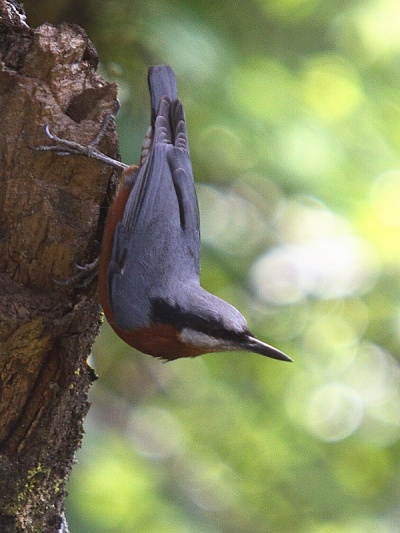(References updated) |
Aloktewari (talk | contribs) (Clearer image of female in typical Nuthatch pose) |
||
| Line 13: | Line 13: | ||
Common in most of its range. | Common in most of its range. | ||
==Taxonomy== | ==Taxonomy== | ||
| − | [[Image:chestnut- | + | [[Image:chestnut-bellied_nuthatch_2_alok.JPG|thumb|350px|right|Ssp. ''almorae'' : Female<br />Photo by {{user|aloktewari|Alok Tewari}}<br />Sat Tal Forest, Alt. 5500 ft., Uttarakhand [[Himalayas]], [[India]], March-2018]] |
Formerly considered [[Dictionary_A-C#C|conspecific]] with [[Burmese Nuthatch]] and [[Indian Nuthatch]]. | Formerly considered [[Dictionary_A-C#C|conspecific]] with [[Burmese Nuthatch]] and [[Indian Nuthatch]]. | ||
Revision as of 11:34, 22 April 2018
- Sitta cinnamoventris
Identification
14cm (5½ in)
- Grey upperparts (no contrast to crown)
- Rufous belly and underparts
- White undertail-coverts with chestnut scalloping
- Black eyestripe
- Dark iris
- Long, blunt grey bill and grey legs
Distribution
Found in the Himalayas from Pakistan east to India, Nepal, Bhutan, southern China, Burma, northern Thailand, Laos and northern Vietnam.
Common in most of its range.
Taxonomy

Photo by Alok Tewari
Sat Tal Forest, Alt. 5500 ft., Uttarakhand Himalayas, India, March-2018
Formerly considered conspecific with Burmese Nuthatch and Indian Nuthatch.
Forms a superspecies with Eurasian Nuthatch, Chestnut-vented Nuthatch, Indian Nuthatch, Burmese Nuthatch and Kashmir Nuthatch.
Subspecies
There are 4 subspecies[1]:
- S. c. almorae:
- S. c. cinnamoventris:
- Eastern Himalayas (eastern Nepal to north-western Yunnan and Arunachal Pradesh)
- S. c. koelzi:
- South-eastern Arunachal Pradesh to Assam and adjacent north-western Myanmar
- S. c. tonkinensis:
Habitat
Moist lowland and hill forests.
Behaviour
Breeding
It nests in a hole or crevice.
Diet
The diet includes insects, nuts and seeds.
Forages singly, in pairs or small groups.
Movements
A resident species.
References
- Clements, J. F., T. S. Schulenberg, M. J. Iliff, D. Roberson, T. A. Fredericks, B. L. Sullivan, and C. L. Wood. 2017. The eBird/Clements checklist of birds of the world: v2017, with updates to August 2017. Downloaded from http://www.birds.cornell.edu/clementschecklist/download/
- Del Hoyo, J, A Elliott, and D Christie, eds. 2008. Handbook of the Birds of the World. Volume 13: Penduline-tits to Shrikes. Barcelona: Lynx Edicions. ISBN 978-8496553453
- Avibase
- Wikipedia
- Wapedia
- Del Hoyo, J, A Elliott, and D Christie, eds. 2008. Handbook of the Birds of the World. Volume 13: Penduline-tits to Shrikes. Barcelona: Lynx Edicions. ISBN 978-8496553453
Recommended Citation
- BirdForum Opus contributors. (2024) Chestnut-bellied Nuthatch. In: BirdForum, the forum for wild birds and birding. Retrieved 19 April 2024 from https://www.birdforum.net/opus/Chestnut-bellied_Nuthatch
External Links




